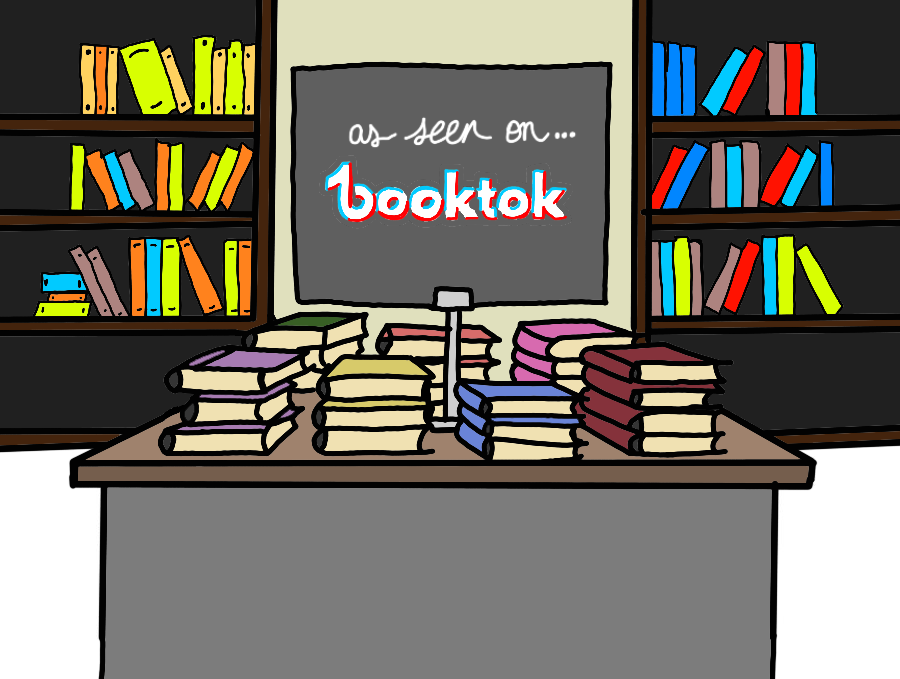Just about anyone who has a TikTok account and also likes to read knows about BookTok. “BookTok” is a community on TikTok where readers share their book reviews, recommendations, reactions and critiques, influencing or “de-influencing” others based on their videos.
Captions like “Controversial Books that I Love” or “Books I Wish I Could Read Again for the First Time” often accompany such videos. The hashtag “BookTok” has nearly 38.2 million posts and over 309 billion views, and BookTok’s reach is constantly growing.
Unsurprisingly, BookTok has significantly impacted the publishing industry. According to the New York Times, BookTok helped sell approximately 20 million printed books in 2021, with that number doubling in 2022.
BookTok is dominated not by big publishers or authors but by small, regular creators who simply share their opinions and recommendations. Many reviews do not even include information about the plot or quality of writing but rather how the book made the reviewer feel.
Due to its increased influence on the reading community and publishing industry, BookTok has recently been overwhelmed by conflicting opinions about its effects.
One positive outcome of BookTok is the drastic increase in young readers. By romanticizing reading and popularizing different aesthetics and trends, BookTok has influenced thousands of people, particularly teens, to get into reading.
“In a poll of over 2,000 16-25-year-olds, almost two-thirds (59%) say that BookTok or book influencers have helped them discover a passion for reading,” according to the Publishers Association in the United Kingdom.
However, multiple concerns have also been raised about BookTok, especially its impact on the quality of literature produced due to its emphasis on over-consumption.
BookTok has emphasized aesthetics over practicality, with many creators owning multiple copies of the same book and basing their entire page on the aesthetic books that they own. The books on the shelves behind them become trophies in a display case, meant to entice readers to collect rather than read.
Patricia Morgan, a junior secondary English education major at Mississippi State University, explained how emphasizing aesthetics is not always bad.
“I don’t really see a way that buying multiple copies is harmful, if someone has such a passion for the book that they buy it in multiples, I think it shows an appreciation for it,” Morgan said.
Booktok also places considerable emphasis on trends, particularly trends involving the number of books one reads. This has led to an insurgence of readers reading not to enjoy the book but to add it to an ever-growing list.
This, in turn, affects the publishing industry. As authors notice these trends, they begin to produce lower-quality literature to meet the demands of an influential community that can significantly increase their sales with one viral video.
Haley Graham, known as @whathalesreading on TikTok, is a self-proclaimed bookworm and BookTok creator. Graham said these books are often created in a hurry, which causes them to have mistakes that Graham says ruin them.
“There have been some books that I have read because of TikTok that the author didn’t do research about the topic they were talking about, so they were misinformed, and that ruins the book,” Graham said.
In one video, Graham talked about another problem that has appeared on BookTok— the heated debates about what constitutes “good literature.”
There are many people who defend this “lower-quality literature,” and then there are those who staunchly object to what some users refer to as the book community’s trash television. In fact, people are incredibly divided on what good literature is and who gets to decide.
Readers are torn between thinking critically about the material they read and using reading as a means of escaping the world around them, and everyone seems to have a different opinion about which one should be used to judge.
For Graham, this debate is pretty simple.
“I don’t think that a sound piece of literature has to be the same as an enjoyable book,” Graham said.
The term “good” is subjective; it can mean both a “sound” piece of literature with a well-developed plot and dynamic characters, or it can mean an enjoyable book that pulls readers in with its captivating storyline. Either way, readers have much to consider when watching these videos.
Although BookTok has a number of implications, it is also a fairly new platform, and the long-term effects have yet to be determined.









